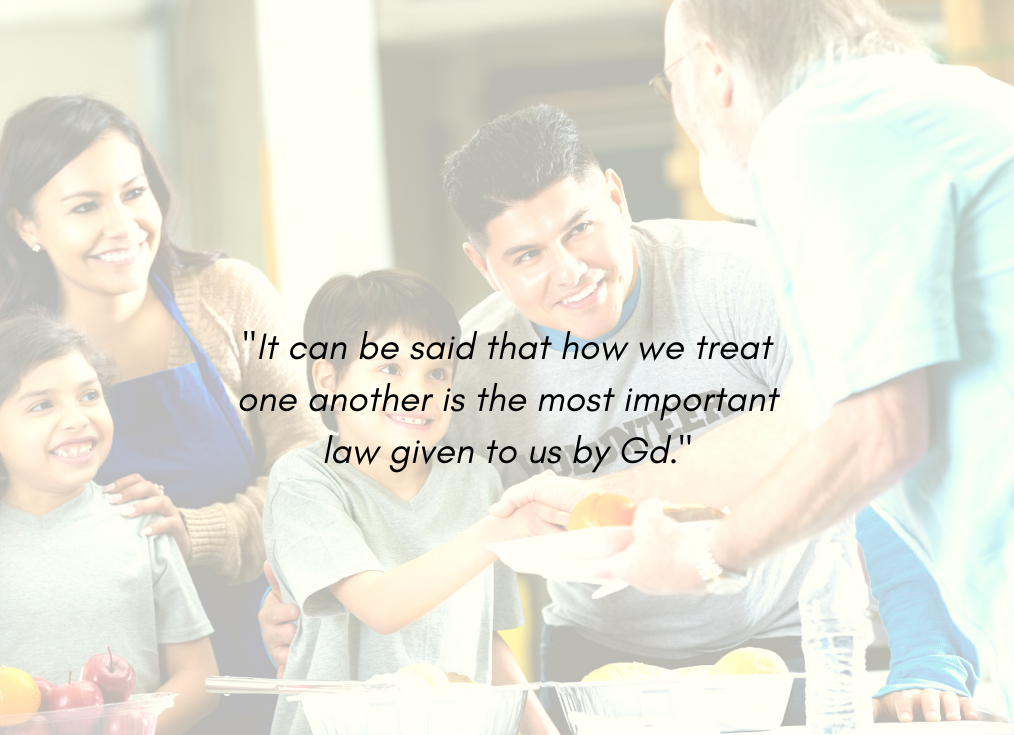Treating Others With Kindness

January 28, 2022
It is believed that the origins of the frequently played game of Jewish Geography can be found in the verses of this week’s Torah portion, Mishpatim. For those unfamiliar with the game, it is played like this:
Jew 1 – Nice to meet you. So where are you from?
Jew 2 – Nice to meet you too. I’m from <<some place around the world>>
Jew 1 – Oh, do you know <<insert name>>?
Jew 2 response (a) – yes! GAME OVER
Jew 2 response (b) – no, unfortunately not, but my parents/spouse are from <<insert new city>> PLAY AGAIN UNTIL SOMEONE IN COMMON IS IDENTIFIED…
Candidly, I don’t remember being taught the game myself. All I can remember is that I’ve been playing it forever. It’s almost like it was hardwired into my socialization protocols.
Now, in all fairness, I cannot speak as to whether my friends and neighbors of other cultures, religions, and ethnic origins play a similar version of this game, however, what I can say is that Jews, no matter where they are from are assumed to have shared friends and therefore not be complete “strangers” to one another when they meet for the first time.
Why the need for a common bond? Because the Torah bundles Jews together and instructs us in this week’s Torah portion that we, “shall not wrong a stranger” (Exodus 22:20) nor shall we, “oppress a stranger” (Ex. 23:9). Clearly, we are warned that because we were, “strangers in the land of Egypt” (Ex. 22:20 & 23:9) we have a social responsibility to treat “others” with kindness, fairness, and civility.
Gd knew that we would treat fellow Jews with an immediate sense of familiarity, building community and welcoming this new member of the tribe into our social circles. However, the “stranger”, the person unfamiliar to us, the unknown visitor might not receive the same warmth, hospitality, and immediate trust, which is why we are commanded to not treat them poorly.
It can be said that how we treat one another is the most important law given to us by Gd. In fact, the rabbis go into a great discussion on the laws in this week’s Torah portion because of their awkward insertion in this part of the Exodus story. Why after having just received the Ten Commandments, after having just experienced Gd’s revelation, does the Torah have a parshah that goes from the greatest heights of spirituality to the nitty-gritty social legislation on the treatment of slaves, personal injury, and property legalese? The answer is that if we do not treat each other the right way, how will we treat Gd’s other creations or even our relationship with Gd.
This week, in recognition of Texas Holocaust Remembrance Week, and specifically honoring Holocaust Memorial Day (1/27), the Holocaust Memorial Museum of San Antonio presented 20 virtual presentations that not only reached across our community, but across the United States, and beyond. The lessons taught, the personal stories shared, and the questions answered were all made possible because of the generosity of the donors to the Jewish Federation’s Annual Campaign and through private donations to the museum.
Teaching our extended community about the importance of being an “upstander” versus a bystander. Reaching out and building relationships with our public-school educators, our district administrators, and our local neighbors and friends, are all part of understanding that we cannot be strangers to one another. Building community is critical.
I usually wrap up this column with a call to come together as a Jewish community. This week, however, my call to action is to reaffirm a relationship with our extended community. This week let’s reach out and live by the words of parashat Mishpatim and by the message of being an upstander and actively doing right in the world. This week let’s extend a welcome to a stranger so that this stranger won’t feel like the strangers that we once were in Egypt and WWII Europe. Because we are…
STRONGER TOGETHER.
Shabbat shalom,

